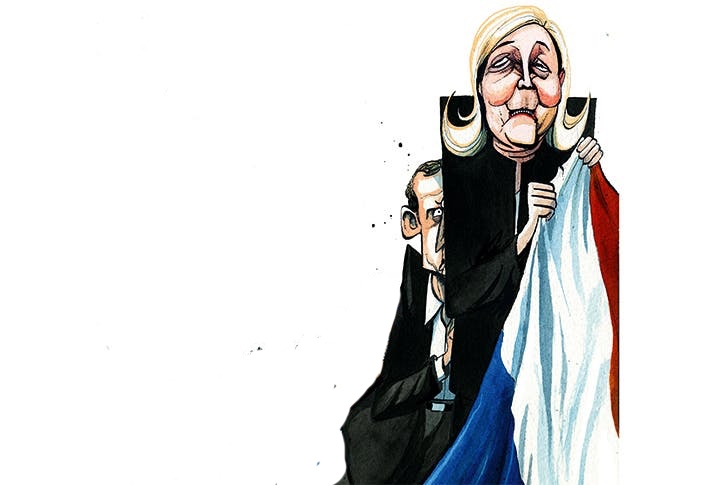Five years ago, Emmanuel Macron was ‘en marche’ to his improbable ascent to the presidency of France. Last night, having united France against him, the certitude that he will be reelected in 270 days has evaporated.
Results of the second round of regional elections can only be described as a disaster for the president. His bespoke political party, La République en Marche, has collapsed. And worse, his preferred presidential opponent, Marine Le Pen, lost any remaining credibility as a serious alternative. That could leave him facing a traditional conservative next year – one who might not be eliminated in advance, as François Fillon was last time, by a convenient criminal investigation.
The message is loud and clear. French voters are weary of the sight of both Macron and Le Pen. Macron has failed to deliver any substantial element of his reform program, has demonstrated an inability to come to grips with a deteriorating security problem, fumbled the COVID crisis and is obsessed with a European ideology that does not resonate at all with voters.
Le Pen’s failure to present anything resembling a coherent plan to extract France from its social and economic crisis, and her flailing efforts to present herself as a moderate, produced not a single regional or departmental victory. It’s difficult to choose which one is more disagreeable to the electorate.
Although nothing is ever clear in French politics, voters now seem highly unlikely to support a rerun of the duel between her and Macron in the presidential elections. Macron has tried to shrug off yesterday’s results but he must be chewing the carpets in the Elysée this morning. Even if he makes it to the second round, his reelection is no longer a foregone conclusion. The opportunistic politicians and journalists who supported him are considering their options.
Abstention in a nation that usually takes seriously the duty to vote was once again the unequivocal winner last night as the votes were counted, and they didn’t take long to count as only one third of voters showed up.
Absurd opinion polls have recently been claiming 40 percent support for Macron. That might be true among the political elite but is unequivocal nonsense outside the huppée arrondissements of Paris. In la France profonde, support for him is invisible. The pollsters at best are asking the wrong questions.
What these polls indicate is that Macron might still win in a second round against Le Pen. But not in a contest pitting the president against whoever emerges as next April’s Républicain candidate, either Xavier Bertrand or Valérie Pécresse, both of them easily reelected yesterday as regional presidents of Haute France (the northern region around Calais) and Île de France (greater Paris), respectively.
Nationally, support for Macronism is currently practically invisible. Like Le Pen, his party did not win a single department. His phantom political movement has no ground game, few activists, and the support of probably no more than 6 to 7 percent of voters. And that’s being generous.
Le Pen popped up on the news channels last night appearing to blame her own voters for having deserted her. Which they did. She was thrashed, even in her electoral heartland of Provence, where the traditional right won 57 percent of the votes cast, versus 43 percent for her Rassemblement National, née the National Front. She entered the campaign over promising, targeting three regions. She won none.
This curious election deserted by an overwhelming majority of actual voters sets up the intriguing possibility that having reached the second round and losing in the last two presidential elections, Le Pen might not make it to the second round at all next year.
Her problem will be hugely complicated if Éric Zemmour, the Tucker Carlson of France, runs against her from the right, as appears increasingly probable. He could easily siphon 5 to 10 percent of votes from her in round one. It wouldn’t project Zemmour (‘Zed’) to the Elysée or even into round two, but it would be a lethal suicide bombing against Le Pen, and probably wouldn’t do any harm to Zemmour’s career. Le Pen hates him, for obvious reasons. The sentiment is mutual, although he’s mostly contemptuous of her incompetence.
No review of yesterday’s events is complete without a distribution of wooden spoons to the left and the greens. The left is hopelessly split between traditional socialists, communists and the eccentric cultists of the Corbyn-like Jean-Luc Mélonchon’s France Insoumise (France Unbowed). The greens have simply no appeal beyond the bourgeois bohemians of Montreuil.
Today, the electoral map of France regions remains unchanged. Not one department flipped. But the calculus for next year has been completely overturned. Macron, narcissistic and disagreeable, is leading an army supported by elite media and bourgeois Parisians, but with no soldiers.
As Macron’s election in 2016 demonstrated, the only thing predictable about French presidential politics is its unpredictability. Macron’s reelection prospects are this morning as wobbly as a blancmange.
This article was originally published on The Spectator’s UK website.


















